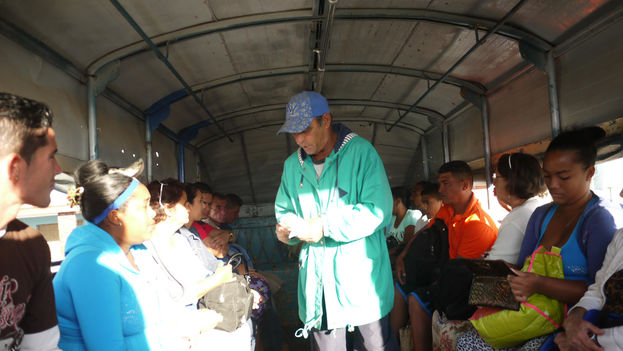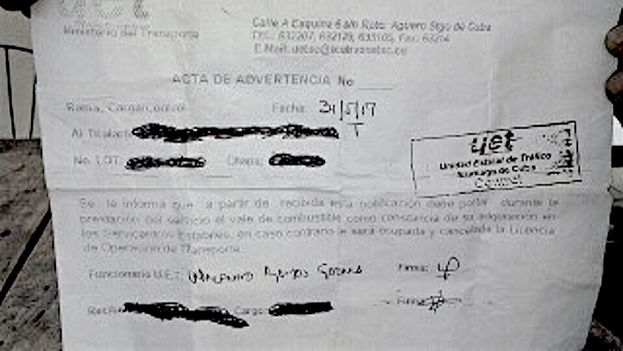
![]() 14ymedio, Havana, 12 June 2017 –Authorities have taken a firm stand with private transportation in Santiago de Cuba and have begun to demand exhaustive proof of fuel purchases from the state gas stations to verify that they are not from the black market.
14ymedio, Havana, 12 June 2017 –Authorities have taken a firm stand with private transportation in Santiago de Cuba and have begun to demand exhaustive proof of fuel purchases from the state gas stations to verify that they are not from the black market.
“Last Friday there was a massive operation, and four drivers were detained in the Micro 9 unit,” says activist Jose Antonio Lopez Pena, who closely follows the transportation issue in the eastern province. At least one of them had to sign a warning, to which this daily had access, in which they confirm that he cannot operate as a carrier if he does not buy fuel in the state gas stations.
The warning is issued by the Ministry of Transportation and signed by Wilfredo Ramos, an official with the province’s State Traffic Unit (UTE).
The application of the rule, which was already widespread in Havana and in the west, has been extended to the eastern zone since the end of May and deeply disturbs the carriers who resort en masse to the black market to buy fuel. Most of that gasoline comes from diversions from the state sector.
“The police and inspectors know that we can’t make a living if we buy oil and gasoline from the State,” explains Ramon, who drives an old truck from the middle of the last century to make the route between several Santiago municipalities.

The private carriers complain about the large sums of money they spend on licenses, taxes and vehicle repairs, so they try to make money by acquiring fuel on the black market at a lower price than the official rate.
During recent months instability in the petroleum supply from Venezuela caused significant cuts in distribution within the state sector. This situation triggered the price of the product in the informal market which is fed by diversions from businesses, entities and personal allotment that is given to some professionals like doctors.
From eight Cuban pesos (CUPs) per liter, petroleum suddenly rose to 15 on the so-called black market, while in the state service centers the equivalent is sold for 24 CUPs per liter (roughly 1$ US, or about $4 a gallon).
The government has responded by setting prices for private transportation in some places like Havana and also started a cooperative that tries to compete with individuals. However, the vintage taxis and trucks managed by the self-employed continue to be one of the most popular forms of transportation among the municipalities and provinces.
The carriers guild is quite big in the country but lacks its own union which could press for an improvement in work conditions. More than 80% of self-employed workers, according to official data, belong to the official Workers Center of Cuba.
Translated by Mary Lou Keel
